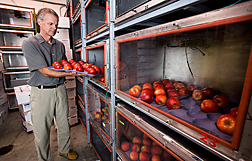This page has been archived and is being provided for reference purposes only. The page is no longer being updated, and therefore, links on the page may be invalid.
Read the magazine story to find out more. |
|
|
ARS-Studied Gas Helps Apples Stay Crisp
By Jan SuszkiwOctober 17, 2007
A mushy apple makes a disappointing snack. And despite extensive precautions taken to properly store freshly picked fruit and market it to consumers in a timely fashion, mushy apples can still happen.
Now, thanks in large part to Agricultural Research Service (ARS) studies, a gaseous compound called 1-MCP is helping prolong the fruit's quality and crispness.
1-MCP works by blocking ethylene, a colorless, odorless gas that naturally regulates ripening and aging, according to James Mattheis, a plant physiologist in the ARS Tree Fruit Research Laboratory at Wenatchee, Wash.
There, starting in the mid-1990s, Mattheis coordinated studies that were the first to show that 1-MCP prevents superficial apple scald, a peel-discoloring disorder that's a major storage problem. That finding, in turn, has led to 1-MCP's use as an alternative to preventing apple scald with diphenylamine, a chemical antioxidant that requires close monitoring.
Mattheis' studies also showed that 1-MCP can inhibit fungal rots in apples stored under controlled-atmosphere (CA) conditions, which use specific mixtures of oxygen and carbon dioxide to slow ethylene production.
Commercial use of 1-MCP, marketed since 2002 as the product SmartFresh, has helped reduce fungicide use in apples. Maine's 2004 apple crop, for example, saw a 43 percent decrease in fungicide use. And on CA-stored Red Delicious and Granny Smith apples, 1-MCP treatments effectively prevented scald without diphenylamine.
Under a trust-fund agreement with the Washington Tree Fruit Research Commission, Mattheis evaluated the gas on Gala, Red Delicious, Golden Delicious, Braeburn, Granny Smith, Fuji and Pink Lady apples. His studies identified the best application methods and dosages to use for each variety, and also showed their physiological responses to the regimens.
1-MCP-treated apples generally stayed firm for three to six months longer than untreated controls in CA-storage conditions. Red Delicious apples, for example, stayed crunchier for two to three weeks longer than untreated controls when removed from storage.
Read more about the research in the October 2007 issue of Agricultural Research magazine.
ARS is the U.S. Department of Agriculture's chief scientific research agency.

